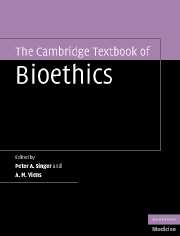Book contents
- Frontmatter
- Contents
- List of contributors
- Acknowledgements
- 1 Introduction
- Section I Information problems
- Section II End of life care
- Section III Pregnant women and children
- Section IV Genetics and biotechnology
- Section V Research ethics
- Section VI Health systems and institutions
- Section VII Using clinical ethics to make an impact in healthcare
- Section VIII Global health ethics
- Section IX Religious and cultural perspectives in bioethics
- Introduction
- 47 Aboriginal bioethics
- 48 Buddhist bioethics
- 49 Chinese bioethics
- 50 Hindu and Sikh bioethics
- 51 Islamic bioethics
- 52 Jehovah's Witness bioethics
- 53 Jewish bioethics
- 54 Protestant bioethics
- 55 Roman Catholic bioethics
- Section X Specialty bioethics
- Index
- References
52 - Jehovah's Witness bioethics
Published online by Cambridge University Press: 30 October 2009
- Frontmatter
- Contents
- List of contributors
- Acknowledgements
- 1 Introduction
- Section I Information problems
- Section II End of life care
- Section III Pregnant women and children
- Section IV Genetics and biotechnology
- Section V Research ethics
- Section VI Health systems and institutions
- Section VII Using clinical ethics to make an impact in healthcare
- Section VIII Global health ethics
- Section IX Religious and cultural perspectives in bioethics
- Introduction
- 47 Aboriginal bioethics
- 48 Buddhist bioethics
- 49 Chinese bioethics
- 50 Hindu and Sikh bioethics
- 51 Islamic bioethics
- 52 Jehovah's Witness bioethics
- 53 Jewish bioethics
- 54 Protestant bioethics
- 55 Roman Catholic bioethics
- Section X Specialty bioethics
- Index
- References
Summary
A 65-year-old Jehovah's Witness (JW) elder was admitted for a three-day history of dizziness, weakness, shortness of breath, and hematochezia. His hemoglobin level on admission was 70 g/l. He was mentally competent and fully committed to the religion. He refused any blood products under any circumstances. Colonic diverticular bleeding was diagnosed. Despite maximum conservative treatment, the bleeding continued. A decision was made to perform a subtotal colectomy without blood products.
A 17-year-old JW female was brought to an emergency department after a suicide attempt by self-inflicting multiple cuts to her left medial elbow. The wound reached the main artery. By the time she was found in her bed, she had lost a large amount of blood and was hypotensive and lethargic. The first words the JW parents gave to the emergency personnel were that she must not receive blood transfusion. When confronted with the emergency physician who advised them that blood transfusion was inevitable, the parents threatened lawsuit against him and the hospital if he gave her blood. They called in a congregation elder, who handed out the list of “no-blood alternatives” published by their organization and insisted on using them, but not blood. She did not carry an advance directive. Despite a large volume fluid resuscitation, hemorrhagic shock ensued.
What is Jehovah's Witness bioethics?
What is Jehovah's Witnesses?
Jehovah's Witnesses (JW) is a bible-based religion founded in the late nineteenth century in Pennsylvania, USA (Penton, 1998).
- Type
- Chapter
- Information
- The Cambridge Textbook of Bioethics , pp. 416 - 423Publisher: Cambridge University PressPrint publication year: 2008
References
- 2
- Cited by



